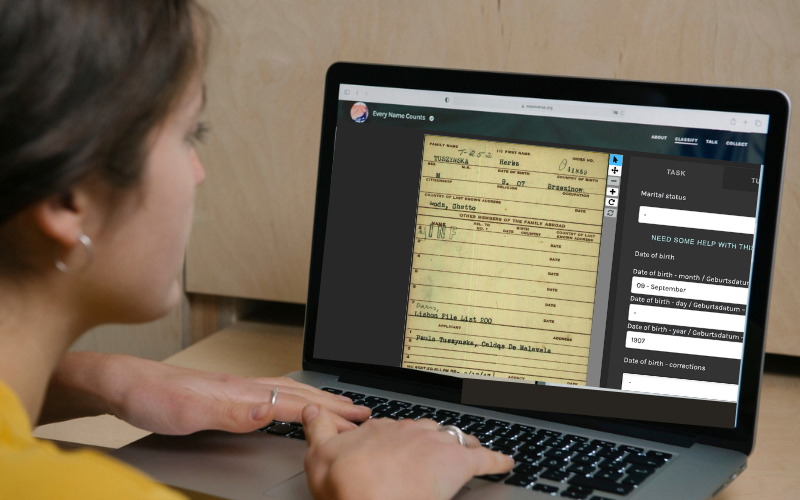#everynamecounts: 20,000 documents in two days!

#everynamecounts starts a new round in 2022: To mark International Holocaust Remembrance Day on January 27, we are calling on volunteers everywhere to join our crowdsourcing initiative. Together we want to index 20,000 documents in 48 hours for the world’s largest online archive on the victims of Nazi persecution. Find out everything you need to know to take part in the challenge!
With #everynamecounts, anyone can take a stand for remembrance. The crowdsourcing initiative is building a digital monument to the victims of Nazi persecution. We aim to make all of our information available in our online archive by 2025. More than 22,000 registered volunteers have already indexed over 5.1 million documents from their homes.
It’s easy to join in!
To help our digital memorial grow even faster, we are issuing a challenge for International Holocaust Remembrance Day on January 27: From 6 p.m. on January 26 to 6 p.m. on January 28, we want to index 20,000 documents on victims of Nazi persecution so we can tell a part of their personal story. It’s easy to join in, and you don’t need any prior experience. Our Deputy Head of Archives Giora Zwilling explains how it works in this video:
The documents
The documents we want to index during our Holocaust Remembrance Day challenge come from one of our partners, the Yad Vashem World Holocaust Remembrance Center. These documents are part of what’s known as the Central Location Index (CLI), a collection of data created by various aid organizations starting in May 1944. The entire collection comprises 1,200,000 cards and 250,000 documents, none of which have been digitally indexed.
Cooperation with Yad Vashem
Yad Vashem is making the collection available to the #everynamecounts project so the digital memorial to victims of the Nazis can continue to grow. The digitized data will be accessible in both the online archive of the Arolsen Archives and the Yad Vashem database. The CLI was an umbrella organization based in New York which coordinated the search for Jewish and non-Jewish family members between 1944 and 1949. Diverse groups – mostly American, but also international – joined together under this organization to centralize their search efforts. The new organization thus quickly led the way in the search for relatives.
In our first indexing challenge in 2022, we will transcribe basic information about missing persons from the CLI cards, such as their names, dates and places of birth, and professions. The cards also include the last known address of the missing individuals, the name of the person who submitted the original search inquiry, and where surviving relatives might be found.

